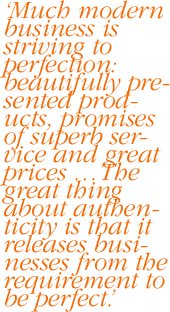

 |
 |
Chapter summary
Authenticity
Four hundred years ago, Shakespeare gave us the ethical principle:
“This above all—to thine own self be true”
but, with a delicious sense of irony, had it articulated by Polonius, as slippery and untrustworthy a character as you could wish for. Perhaps this is the challenge of authenticity: it’s quite easy to talk about and not so easy to do. If authenticity is hard for people to achieve, it is even harder for businesses.
Yet developing greater authenticity will help future organisations to be more effective at satisfying human needs. It will help us to respond to a world where people’s faith in marketing has fallen to new lows, as we simply fail to engage with the claims advertisers make.
The humanity has been driven out of most branding programmes, replaced by an ever-growing list of clever-sounding jargon and “tools” designed to manipulate rather than engage with consumers. It seems to me that the cleverer these tools seem to be, the more trust is compromised and real human value destroyed.
In common with my co-authors, I do not believe branding is inherently either good or bad. However, in order for it to play a positive role in society, branding must adapt to respond more responsibly to real human needs.
Without authentic communication among the human beings inside and around brands, little of worth can be achieved. With authenticity, the unique creative abilities of human beings can be released to create real value.
This chapter is divided into three parts:
Part One: What authenticity is, and the trouble it can cause
Part Two: Why authenticity is becoming more important
Part Three: What businesses can do to benefit from authenticity
Read more in the full book
Next chapter: Brand, Dynamic Valuation & Transparent Governance of Living Systems
